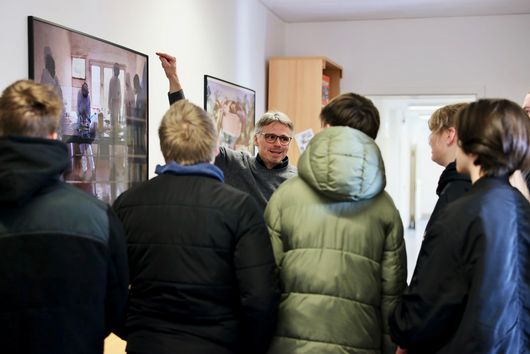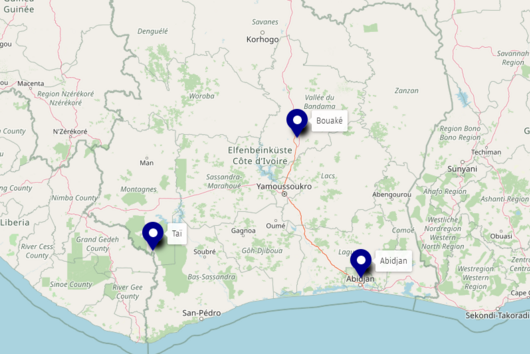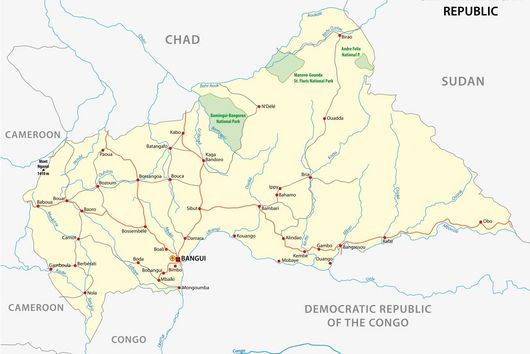A contribution by Franziska Stoek, One Health Surveillance Working Group at HIOH, Maxence Feher, Robert Koch Institute Berlin, and Pina Knauff, Bundeswehr Institute of Microbiology, Munich.

In order to be able to react quickly and safely in the event of a disease outbreak, the establishment of mobile diagnostic structures is of central importance. In the partner laboratory of the Helmholtz Institute for One Health (HIOH) at the Centre Hospitalier et Universitaire de Bouaké (CHUB) in Côte d'Ivoire, a modern mobile laboratory has recently come into service, making an important contribution to strengthening national health care and the early detection of infectious diseases.
The core of the mobile laboratory is a mobile foldable glovebox for the safe handling of highly infectious pathogens, which was developed by the Institute of Microbiology of the German Armed Forces (IMB). In order to be able to react quickly and efficiently to a potential epidemic, the mobile laboratory also includes several diagnostic modules for the molecular detection of pathogens and personal protective equipment for the laboratory staff. The entire equipment can be packed in just 16 boxes, making it easy to transport and set up at a wide variety of locations in the field. The laboratory is also highly autonomous, as it only requires electricity, water and a weather-protected location for operation.
This important diagnostic tool, which was handed over to the Centre Hospitalier et Universitaire de Bouaké (CHUB) by the German Federal Foreign Office's German Biosecurity Programme during the Ebola epidemic in 2016, is now ready for use: In a joint campaign by the HIOH, the Robert Koch Institute (RKI), the IMB and the CHUB in February 2025, we not only replaced outdated equipment and replenished consumables, but also trained future users in the safe handling of the equipment.
The training focused on an introduction to working with the glovebox, a hermetically sealed container for the safe handling of potentially hazardous samples. For this purpose, the entire mobile laboratory was set up in the seminar room of the CHUB molecular biology laboratory. In order to be prepared for outbreak situations, the participants practiced various realistic scenarios related to sample delivery and potential problems that may occur in the laboratory. The course instructors encouraged participants to independently develop possible solutions and approaches under guided supervision. In the spirit of the One Health approach – and in order to promote multidisciplinary collaboration in public health – seven professionals from different disciplines took part in the workshop: In addition to microbiologists, technical assistants and a medical doctor from the CHUB, these included a scientific employee from the Centre Suisse de Recherches Scientifiques (CSRS) in Abidjan and the University of Korhogo, who specializes in the analysis of wild animal samples, as well as a senior technical employee from the Institut Pasteur in Abidjan (IPCI).
With this training and the mobilization of the mobile laboratory and thanks to funding from the German Federal Ministry of Health (BMG) as part of the Public Health Actions for Côte d'Ivoire (PAcCI) project, we were able to support important milestones in strengthening national pandemic prevention in Côte d'Ivoire. The course further consolidated the long-standing cooperation between the CHUB, which is the only university hospital outside Abidjan to serve the entire north of Côte d'Ivoire, and its partner institutions HIOH and RKI. Additional trainings on the use of the mobile laboratory in the field will follow to ensure the most effective response in the event of a disease outbreak.










![[Translate to English:] Glaskugel mit Schema zum One Health Ansatz](/fileadmin/HIOH/__processed__/6/3/csm_header_6000px-format4-3-150dpi_72_f8c5bcd651.png)
![[Translate to English:] Portrait von Prof. Fabian Leendertz](/fileadmin/HIOH/__processed__/6/5/csm_Portrait-Fabian-Leendertz-Copyright_Stefan_Sauer_72_bf4b2ab673.jpg)
![[Translate to English:] Portrait von Fabian Leendertz © Stefan Sauer](/fileadmin/HIOH/__processed__/8/0/csm_copyright_Stefan_Sauer_72_1396ecab68.jpg)
![[Translate to English:] Hauptgebäude der Universität Greifswald](/fileadmin/HIOH/__processed__/b/9/csm_copyright_Greifswald_University_Jan_Messerschmidt_c6f86932c5.jpg)